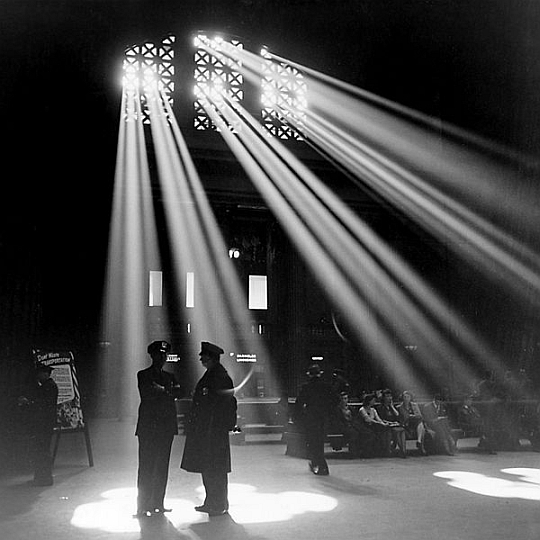
Hog Butcher for the World,
Tool Maker, Stacker of Wheat,
Player with Railroads and the Nation’s Freight Handler;
Stormy, husky, brawling,
City of the Big Shoulders:
They tell me you are wicked and I believe them, for I
have seen your painted women under the gas lamps
luring the farm boys.
And they tell me you are crooked and I answer: Yes, it
is true I have seen the gunman kill and go free to
kill again.
And they tell me you are brutal and my reply is: On the
faces of women and children I have seen the marks
of wanton hunger.
And having answered so I turn once more to those who
sneer at this my city, and I give them back the sneer
and say to them:
Come and show me another city with lifted head singing
so proud to be alive and coarse and strong and cunning.
Flinging magnetic curses amid the toil of piling job on
job, here is a tall bold slugger set vivid against the
little soft cities;
Fierce as a dog with tongue lapping for action, cunning
as a savage pitted against the wilderness,
Bareheaded,
Shoveling,
Wrecking,
Planning,
Building, breaking, rebuilding,
Under the smoke, dust all over his mouth, laughing with
white teeth,
Under the terrible burden of destiny laughing as a young
man laughs,
Laughing even as an ignorant fighter laughs who has
never lost a battle,
Bragging and laughing that under his wrist is the pulse.
and under his ribs the heart of the people,
Laughing!
Laughing the stormy, husky, brawling laughter of
Youth, half-naked, sweating, proud to be Hog
Butcher, Tool Maker, Stacker of Wheat, Player with
Railroads and Freight Handler to the Nation.
—Carl Sandburg, Chicago in Chicago Poems (1916).
America, the Republican ticket would have us believe, consists of two parts. Says Governor Sarah Palin speaking at a rally in Greensboro, NC on October 17, “We believe that the best of America is in these small towns that we get to visit, and in these wonderful little pockets of what I call the real America, being here with all of you hard working very patriotic, um, very, um, pro-America areas of this great nation.” The rest of America, the large majority of the country that has trouble digesting the Palin message, apparently is the anti-American part. And for good measure, Senator McCain reminds us with his dismissive references to Rezkos and Daleys that Chicago, that loathsome corrupt corner of the Midwest, belongs to the anti-American part. It is easy to dismiss this as unfortunate chatter on the campaign trail. But it is too consequential. At the end of this very long campaign, nothing has come to define the Republican ticket better than its curious geography. George W. Bush launched his War on Terror with the dictum, “You’re with us, or you’re against us.” That principle apparently applied with equal force to his domestic adversaries, and Sarah Palin and her running mate have not relinquished it. The Republican Party implicitly lays claim to the flag and other national insignia of America. It also appears to rule from a base and to view the balance of the nation as hostile occupied territory.
Carl Sandburg reminds us of a Chicago that has long been our nation’s pulsing heart. The second city? Perhaps not. It may well have endemic corruption. It is riddled with poverty and crime. It has seen long periods of racial tension. But Chicago thrives. It gave us Sandburg, and also Saul Bellow; Louis Farrakhan and the Neocons; the nation’s most impressive architecture and the center of our commodities markets. Chicago has no reason to hang its head and every right to claim the mantle of leadership. For the last two years we have seen a political force arising and propelled out of Chicago. One can agree or disagree with the ideas associated with it, but no one can question its vitality, its vigor, its quiet competence and determination. More than once watching it work, I thought back to Sandburg’s Chicago, of that “terrible burden of destiny laughing as a young man laughs.”
The geography of division and isolation misses another fundamental point, namely that the totality of our country is more than a sum of the parts. John McCain should appreciate this from his own background. He comes from a military family, as I do. He lived around the country and the world, as I did. But the McCains are also an old slaveowning family from the Mississippi delta, a family not much different from the McCaslins portrayed by William Faulkner in a series of works. The similarities are so great in fact that I have wondered: did Faulkner model his McCaslins on the McCains of Carroll County? As the Wall Street Journal learned when it paid a call on the McCain family reunion (the candidate skipped out), a good number of the Mississippi McCains are black, some of them were heroes of the Civil Rights movement, and while they know and like John McCain, he seems not to garner so many of their votes as “that one.”
Recall the words that Faulkner puts in the mouth of the aging white family scion Isaac McCaslin in Delta Autumn (1943), addressing the young black woman he recognizes as the smartest and best hope of his clan. Go north, he tells her, go to Chicago where you can pursue your education and have a meaningful life—because all of that will be denied to you here in Mississippi. Will that change? “Maybe in a thousand or two thousand years in America, he thought. But not now! Not now!” But there you see that tie, from the reddest patch of Dixie to the bluest corner of the Midwest, a tie that binds and defines. And on Tuesday, America will answer Isaac McCaslin’s question: has the time come now?



